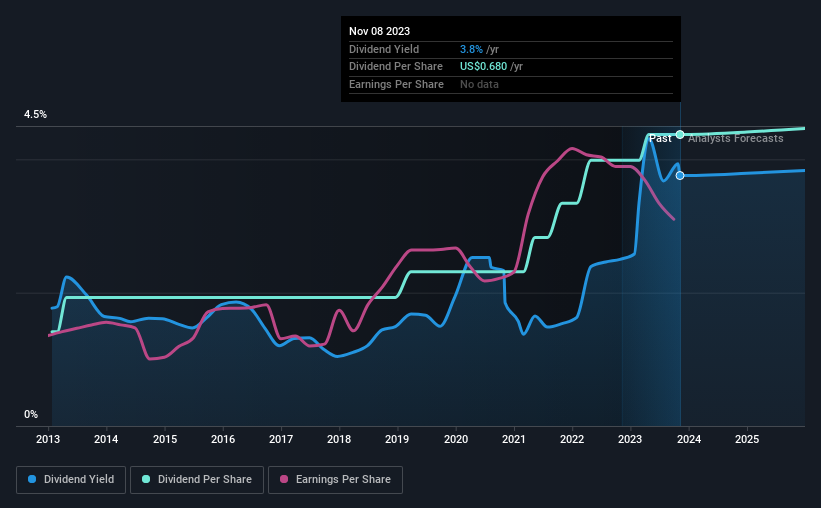ConnectOne Bancorp, Inc. (NASDAQ:CNOB) Looks Interesting, And It's About To Pay A Dividend
It looks like ConnectOne Bancorp, Inc. (NASDAQ:CNOB) is about to go ex-dividend in the next four days. The ex-dividend date is one business day before the record date, which is the cut-off date for shareholders to be present on the company's books to be eligible for a dividend payment. The ex-dividend date is important because any transaction on a stock needs to have been settled before the record date in order to be eligible for a dividend. Thus, you can purchase ConnectOne Bancorp's shares before the 14th of November in order to receive the dividend, which the company will pay on the 1st of December.
The company's upcoming dividend is US$0.17 a share, following on from the last 12 months, when the company distributed a total of US$0.68 per share to shareholders. Calculating the last year's worth of payments shows that ConnectOne Bancorp has a trailing yield of 3.8% on the current share price of $18.1. If you buy this business for its dividend, you should have an idea of whether ConnectOne Bancorp's dividend is reliable and sustainable. As a result, readers should always check whether ConnectOne Bancorp has been able to grow its dividends, or if the dividend might be cut.
Check out our latest analysis for ConnectOne Bancorp
If a company pays out more in dividends than it earned, then the dividend might become unsustainable - hardly an ideal situation. Fortunately ConnectOne Bancorp's payout ratio is modest, at just 28% of profit.
Generally speaking, the lower a company's payout ratios, the more resilient its dividend usually is.
Click here to see the company's payout ratio, plus analyst estimates of its future dividends.
Have Earnings And Dividends Been Growing?
Stocks in companies that generate sustainable earnings growth often make the best dividend prospects, as it is easier to lift the dividend when earnings are rising. If earnings fall far enough, the company could be forced to cut its dividend. For this reason, we're glad to see ConnectOne Bancorp's earnings per share have risen 13% per annum over the last five years.
Another key way to measure a company's dividend prospects is by measuring its historical rate of dividend growth. Since the start of our data, 10 years ago, ConnectOne Bancorp has lifted its dividend by approximately 12% a year on average. It's great to see earnings per share growing rapidly over several years, and dividends per share growing right along with it.
The Bottom Line
From a dividend perspective, should investors buy or avoid ConnectOne Bancorp? Companies like ConnectOne Bancorp that are growing rapidly and paying out a low fraction of earnings, are usually reinvesting heavily in their business. Perhaps even more importantly - this can sometimes signal management is focused on the long term future of the business. We think this is a pretty attractive combination, and would be interested in investigating ConnectOne Bancorp more closely.
On that note, you'll want to research what risks ConnectOne Bancorp is facing. To that end, you should learn about the 2 warning signs we've spotted with ConnectOne Bancorp (including 1 which doesn't sit too well with us).
If you're in the market for strong dividend payers, we recommend checking our selection of top dividend stocks.
Have feedback on this article? Concerned about the content? Get in touch with us directly. Alternatively, email editorial-team (at) simplywallst.com.
This article by Simply Wall St is general in nature. We provide commentary based on historical data and analyst forecasts only using an unbiased methodology and our articles are not intended to be financial advice. It does not constitute a recommendation to buy or sell any stock, and does not take account of your objectives, or your financial situation. We aim to bring you long-term focused analysis driven by fundamental data. Note that our analysis may not factor in the latest price-sensitive company announcements or qualitative material. Simply Wall St has no position in any stocks mentioned.

